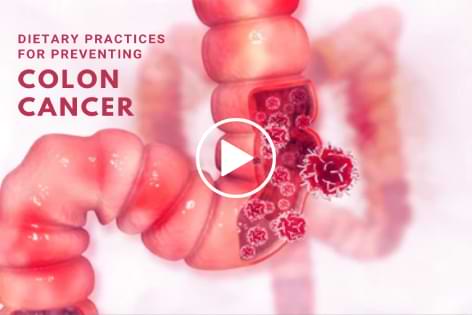
LMU 03 - Reducing Colorectal Cancer Risk: Embracing a Wellness Lifestyle
Source: Journal – Clinics in Colon and Rectal Surgery, Nov., 2009
Lifestyle Medicine Update (March 16, 2016)
Introduction:
Colorectal cancer is the second leading cause of cancer-related deaths in North America and most developed countries. While a small percentage of cases are linked to inherited genetic mutations, diet, and lifestyle choices are the predominant factors contributing to this type of cancer. This article highlights recent findings from a study published in the Journal Clinics in Colon and Rectal Surgery, suggesting that specific dietary changes may reduce the risk of colorectal cancer by up to 70%. Dr. Robin P. Boushey, M.D., Ph.D., guest editor, and Fatima A. Haggar, M.P.H., co-author, explore the impact of diet, exercise, smoking, and alcohol consumption on colorectal cancer incidence and mortality.
The Role of Diet in Colorectal Cancer
Diet plays a significant role in colorectal cancer risk, particularly in consuming animal fats. Studies have shown that animal fat alters the bacterial composition of the large bowel, leading to unhealthy gut flora. These harmful gut bacteria metabolize bile salts into cancer-causing agents, contributing to the development of colon cancer.
High red meat consumption has been linked to an increased risk of colon cancer. Heme iron in red meat further exacerbates this risk, as excess iron generates cancer-causing free radicals in the colon. Cooking meats at high temperatures produces heterocyclic amines and polycyclic aromatic hydrocarbons associated with cancerous mutations.
On the other hand, diets low in fruits and vegetables have also been linked to a higher risk of colorectal cancer. Conversely, higher dietary fiber intake has shown a decreased risk of developing this type of cancer. Fiber attracts water, bulks fecal matter, and moves it through the digestive tract more efficiently. This process dilutes carcinogens and speeds up the removal of any cancer-causing agents present in the bowel. Foods like beans, peas, and whole grains are particularly effective in promoting a healthy colon.
Impact of Lifestyle Choices on Colorectal Cancer Risk
Several lifestyle factors contribute to the risk of developing colorectal cancer. Regular physical exercise has been found to reduce this risk by speeding up the movement of waste through the bowel and lowering insulin levels. Maintaining healthy body weight is crucial, as being overweight is associated with higher insulin and estrogen levels, which can be risk factors for both males and females.
Cigarette smoking is responsible for approximately 12% of colorectal cancer cases. The carcinogens present in tobacco can accelerate cancer growth in the colon and rectum, making quitting smoking an essential step in reducing the risk of this deadly disease. Furthermore, alcohol consumption has been linked to an increased risk of colorectal cancer. Some studies indicate that regular alcohol consumption, even as little as two drinks per day, may double the risk of colon cancer.
Prevention and Screening
Encouragingly, up to 90% of colon cancer cases are believed to be preventable through lifestyle modifications. This includes adopting a healthy diet, engaging in regular physical activity, avoiding smoking, maintaining an ideal weight, and limiting alcohol consumption.
Regular screening is one of the most crucial aspects of preventing colorectal cancer, especially for individuals aged 50 and above. Polyps, potentially developing into cancer, often take 5-10 years to become malignant. Regular screenings allow for the early detection and removal of suspicious growths, significantly reducing the risk of cancer development.
Conclusion
Colorectal cancer remains a primary health concern, but significant progress can be made in reducing its incidence and mortality. By focusing on a wellness lifestyle that includes a balanced diet, regular exercise, avoidance of smoking, and moderate alcohol consumption, individuals can substantially lower their risk of developing this deadly disease. Taking proactive steps, such as participating in regular screenings, protects against colorectal cancer. Embracing these practices promotes a healthy colon and contributes to overall well-being and longevity. Let us collectively work towards a future with fewer cases of colorectal cancer, making a difference in our lives and those of our loved ones.
References
Haggar, F.A., Boushey, R.P., Colorectal cancer epidemiology: Incidence, mortality, survival and risk factors. Clinical Colon-Rectal Surg., 2009 Nov; 22(4): 191–197.
http://www.ncbi.nlm.nih.gov/pmc/articles/PMC2796096
Eat Smart, Live Well, Look Great!
Dr. James Meschino

Dr. James Meschino
ABOUT THE AUTHOR
Dr. James Meschino, DC, MS, ROHP, is an educator, author, and researcher having lectured to thousands of healthcare professionals across North America. He holds a Master’s Degree in Science with specialties in human nutrition and biology and is recognized as an expert in the field of nutrition, anti-aging, fitness, and wellness as well as the author of numerous books.


